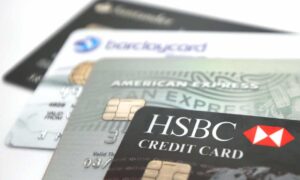
Borrowing on credit cards rose in the second quarter, accompanied by an increase in defaults as people struggled to meet repayment deadlines amid widespread price rises.
Demand for unsecured lending, which is driven by borrowing on credit cards and through personal loans, rose in the three months to June, according to the Bank of England’s quarterly survey of banks and building societies between May 30 and June 17.
The survey results are weighted by lenders’ market share and how much of a change they reported to calculate a net percentage balance of between -100 and 100, where a positive figure shows a rise and a negative one a fall.
There was a positive net balance of 32 when lenders were asked whether demand for unsecured loans was on the rise and a balance of 33 when they were asked whether credit card spending had risen in the past three months. However, banks expect both figures to fall as the cost of living crisis bites.
Lenders reported higher rates of default, when consumers are not able to repay their loans, in the second quarter compared with the start of the year and they expect the figure to continue to rise into the summer as household incomes are squeezed by inflation at a 40-year high.
Demand for mortgages continued to rise in the second quarter, but is expected to fall in the following three months as the market is expected to cool.
Mark Harris, chief executive of SPF Private Clients, the mortgage broker, said that lenders had absorbed some of the costs of borrowing amid rapid interest rate rises. “Remortgaging activity slightly decreased, which is surprising as many borrowers have been keen to secure fixed rates in the face of rising interest rates,” he said.
“Spreads narrowed slightly as lenders absorbed some of the rising cost of borrowing. However, lenders reported that these are expected to widen in the third quarter as mortgage rates continue to rise.”
Interest rates are at a 13-year high of 1.25 per cent.
Read more:
Credit card borrowing rises as cost of living takes toll on consumers






